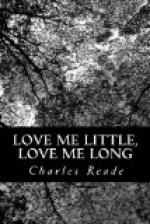Talboys soothed the offended fair. “I really don’t think he meant to insult us; but you know Dodd; he is a good-natured fellow, but he never had the slightest pretension to good-breeding.”
“Don’t you think,” replied the lady, “it would be as well to leave off detracting from Mr. Dodd now that he has just saved your life?”
Talboys opened his eyes. “Why, you began it.”
“Oh, Mr. Talboys, do not descend to evasion. What I say goes for nothing. Mr. Dodd and I are fast friends, and nobody will ever succeed in robbing me of my esteem for him. But you always hated him, and you seize every opportunity of showing your dislike. Poor Mr. Dodd! He has too many great virtues not to be envied—and hated.”
Talboys stood puzzled, and was at a loss which way to steer his tongue, the wind being so shifty. At last he observed a little haughtily that “he never made Mr. Dodd of so much. importance as all this. He owned he had quizzed him, but it was not his intention to quiz him any more; for I do feel under considerable obligations to Mr. Dodd; he has brought us safe across the Channel; at the same time, I own I should have been more grateful if he had beat against the wind and landed us on our native coast; the lugger is there long before this, and our boat was the best of the two.”
“Absurd!” replied Lucy, with cold hauteur. “The lugger had a sharp stern, but ours was a square stern, so we were obliged to run; if we had beat, we should all have been drowned directly.”
Talboys was staggered by this sudden influx of science; but he held his ground. “There is something in that,” said he; “but still, a—a——”
“There, Mr. Talboys,” said the young lady suddenly, assuming extreme languor after delivering a facer, “pray do not engage me in an argument. I do not feel equal to one, especially on a subject that has lost its interest. Can you inform me when this vessel sails?”
“Not till to-morrow morning.”
“Then will you be so kind as to borrow me that little boat? it is dangling from the ship, so it must belong to it. I wish to land, and see whether he has cast us upon an in- or an uninhabited island.”
The sloop’s boat speedily landed them on the island, and Lucy proposed to cross the narrow neck of land and view the sea they had crossed in the dark. This was soon done, and she took that opportunity of looking about for the lateen, for her mind had taken another turn, and she doubted the report that David had gone to intercept the East-Indiaman. A short glance convinced her it was true. About seven miles to leeward, her course west-northwest, her hull every now and then hidden by the waves, her white sails spread like a bird’s, the lateen was flying through the foam at its fastest rate. Lucy gazed at her so long and steadfastly that Talboys took the huff, and strolled along the cliff.
When Lucy turned to go back, she found the French skipper coming toward her with a scrap of paper in his hand. He presented it with a low bow; she took it with a courtesy. It was neatly folded, though not as letters are folded ashore, and it bore her address. She opened it and read:




